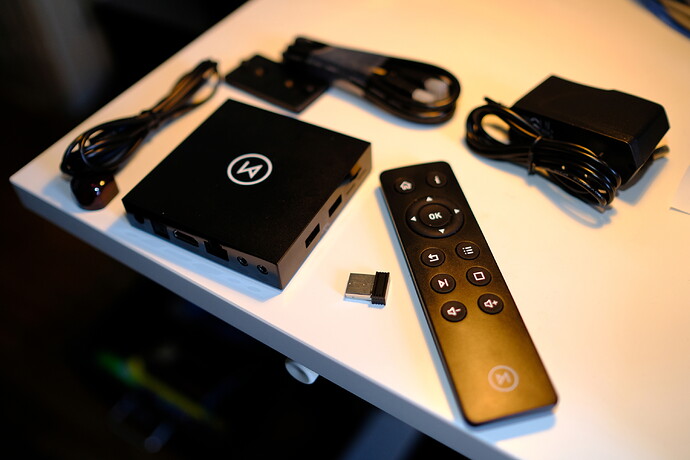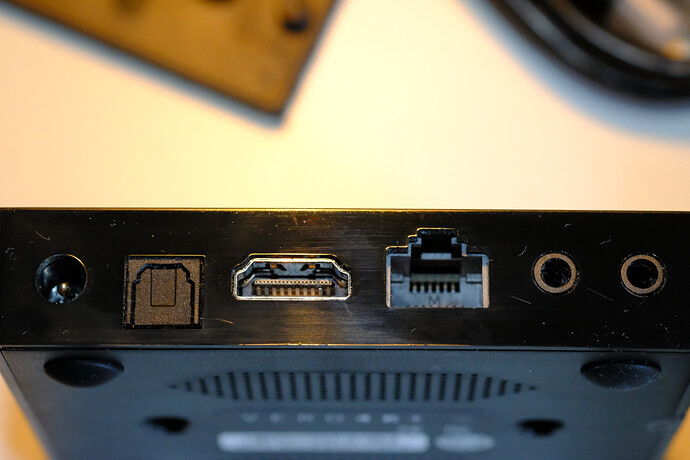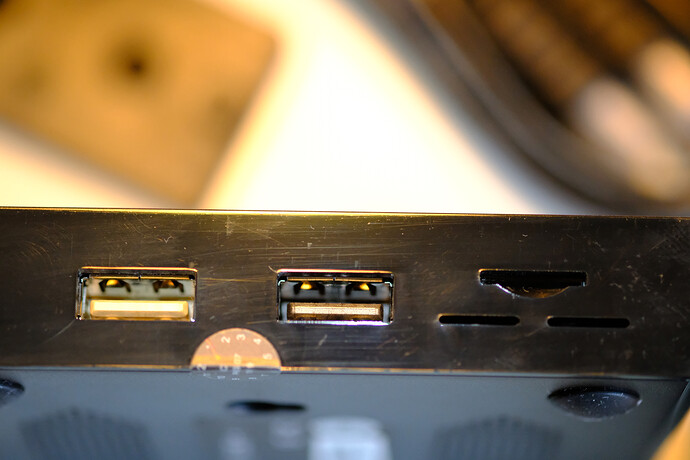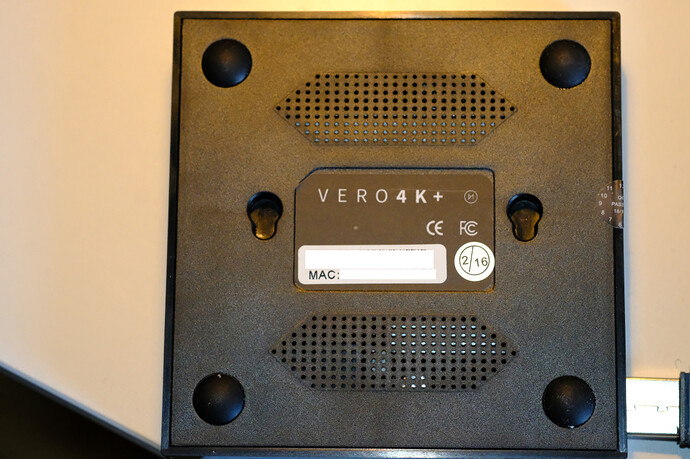Update: I got the device. Here’s what I got in the box:
From the left, clockwise:
- infrared receiver extension kit, with a 1/8" jack
- TV mounting kit
- HDMI cable
- power supply (5V 2A, negative sleeve, positive tip)
- remote controller
- remote receiver dongle
- the vero 4k itself
There are a few things odd, right there. The first thing is the remote looks like an IR remote, and sure enough there’s that “infrared receiver extension kit” shipped with the device. But the website specifically mentions a “OSMC RF remote control” is part of the kit. Is that the same device?
Either way, where does the IR extension kit plug in? As you can see in the picture, there are two 1/8" jacks on the vero, next to the ethernet port. Which one is which?
Then the remote receiver dongle is never mentioned on the website, which clearly says there are two USB ports. Yet one of those needs to be used by the remote receiver, so it’s a bit misleading to say there are two USB ports.
Finally, I would have expected the “TV mounting kit” to be a standard VESA adapter or something of the sort, not something that’s basically a piece of plastic with some glue. ![]()
Going back to my work of clarifying the design, here are the ports in the back of the device, from left to right:
- DC power, presumably 5V <= 2A
- SPDIF audio output
- HDMI port
- Ethernet port
- 1/8" jack, CVBS and analogue audio output
- 1/8" jack, IR extension socket
Then on the “left” side (the right side in the first picture, but left when looking at the front of the Vero):
- USB 2.0 port, white (with OTG support)
- USB 2.0 port, black
- top: microSD card slot
- bottom: two thin slots, presumably for venting
In the picture, the “back” of the device is shown in front, and is where power comes out. The “front” of the device has a LED in front of a “plus” sign (+).
The bottom of the device has two sets of tiny venting holes, the MAC address on a sticker with a bar code, and two holes where the TV mounting kit fits. The center of the holes are about 53mm apart. There are four small rubber pads glued to the bottom of the device as well. There are no obvious screws that would allow me to open the machine and look inside without risking to break it, which might make repairs difficult.
It’s unclear to me what the difference between the “black” and “white” USB ports are. I wish the OSMC folks would provide schematics that would explain at least what each ports are: surely that’s not covered by a NDA… ![]()
Here’s the output of lshw:
$ sudo LANG=C lshw -sanitize
computer
description: Computer
product: Vero4KPlus
width: 32 bits
capabilities: smp
*-core
description: Motherboard
physical id: 0
*-cpu:0
description: CPU
product: cpu
physical id: 0
bus info: cpu@0
size: 667MHz
capacity: 1512MHz
capabilities: cpufreq
*-cpu:1
description: CPU
product: cpu
physical id: 1
bus info: cpu@1
size: 667MHz
capacity: 1512MHz
capabilities: cpufreq
*-cpu:2
description: CPU
product: cpu
physical id: 2
bus info: cpu@2
size: 667MHz
capacity: 1512MHz
capabilities: cpufreq
*-cpu:3
description: CPU
product: cpu
physical id: 3
bus info: cpu@3
size: 667MHz
capacity: 1512MHz
capabilities: fp asimd evtstrm aes pmull sha1 sha2 crc32 wp half thumb fastmult vfp edsp neon vfpv3 tlsi vfpv4 idiva idivt cpufreq
*-cpu:4 DISABLED
description: CPU
product: idle-states
physical id: 4
bus info: cpu@4
*-memory
description: System memory
physical id: 5
size: 1788MiB
*-usbhost:0
product: xHCI Host Controller
vendor: Linux 3.14.29-134-osmc xhci-hcd
physical id: 1
bus info: usb@2
logical name: usb2
version: 3.14
capabilities: usb-3.00
configuration: speed=5000Mbit/s
*-usbhost:1
product: xHCI Host Controller
vendor: Linux 3.14.29-134-osmc xhci-hcd
physical id: 2
bus info: usb@1
logical name: usb1
version: 3.14
capabilities: usb-2.00
configuration: driver=hub slots=2 speed=480Mbit/s
*-usb
description: Mouse
product: USB Keyboard Mouse
vendor: OSMC Remote Controller
physical id: 2
bus info: usb@1:2
version: 1.04
capabilities: usb-1.10
configuration: driver=usbhid maxpower=100mA speed=2Mbit/s
*-network:0
description: Ethernet interface
physical id: 3
logical name: eth0
serial: [REMOVED]
size: 1Gbit/s
capacity: 1Gbit/s
capabilities: ethernet physical tp mii 10bt 10bt-fd 100bt 100bt-fd 1000bt 1000bt-fd autonegotiation
configuration: autonegotiation=on broadcast=yes driver=st_gmac driverversion=March_2013 duplex=full ip=[REMOVED] link=yes multicast=yes port=MII speed=1Gbit/s
*-network:1 DISABLED
description: Wireless interface
physical id: 4
logical name: wlan0
serial: [REMOVED]
capabilities: ethernet physical wireless
configuration: broadcast=yes driver=wl driverversion=0 multicast=yes wireless=IEEE 802.11
For what it’s worth, here’s the output of openssl speed on the Vero 4k+:
type 16 bytes 64 bytes 256 bytes 1024 bytes 8192 bytes 16384 bytes
md2 0.00 0.00 0.00 0.00 0.00 0.00
mdc2 0.00 0.00 0.00 0.00 0.00 0.00
md4 8097.18k 29675.25k 95924.23k 216522.41k 342872.19k 356128.09k
md5 25988.14k 73905.13k 160564.91k 225161.90k 255956.31k 258555.90k
hmac(md5) 8597.54k 30445.93k 90262.02k 177067.69k 246516.39k 254576.67k
sha1 32580.39k 108683.16k 289833.05k 491117.57k 627804.84k 640379.56k
rmd160 5797.63k 19368.85k 48817.24k 78767.10k 95895.55k 97299.11k
rc4 74533.85k 85142.87k 88505.02k 89242.97k 89813.36k 89494.87k
des cbc 23842.10k 26031.71k 26566.57k 26708.99k 26798.76k 26771.46k
des ede3 9098.91k 9477.07k 9547.43k 9571.33k 9581.91k 9579.18k
idea cbc 0.00 0.00 0.00 0.00 0.00 0.00
seed cbc 26287.29k 29971.09k 31200.09k 31612.83k 31629.31k 31637.50k
rc2 cbc 18274.00k 19648.58k 20105.22k 20212.05k 20228.78k 20217.86k
rc5-32/12 cbc 0.00 0.00 0.00 0.00 0.00 0.00
blowfish cbc 38032.13k 45797.12k 48126.72k 48824.66k 49040.04k 49010.01k
cast cbc 33007.17k 38693.61k 40379.82k 40872.96k 41017.34k 40932.69k
aes-128 cbc 47470.68k 56035.67k 59187.20k 60006.06k 60192.09k 60467.37k
aes-192 cbc 41126.68k 47689.36k 49527.13k 50116.61k 50257.92k 50216.96k
aes-256 cbc 37073.26k 42128.49k 43826.26k 44295.51k 44543.66k 44378.79k
camellia-128 cbc 34626.58k 40475.99k 42596.78k 43033.69k 43196.42k 43149.99k
camellia-192 cbc 28361.96k 32345.37k 33645.08k 33985.16k 33887.57k 33942.19k
camellia-256 cbc 28159.71k 31986.07k 33524.70k 33766.40k 33882.11k 33843.88k
sha256 30072.94k 102563.33k 273262.76k 466224.81k 590441.13k 601669.63k
sha512 8697.58k 34891.90k 55140.43k 78177.96k 89270.95k 90161.15k
whirlpool 2177.80k 4507.78k 7382.70k 8781.82k 9315.32k 9333.42k
aes-128 ige 43167.90k 51865.51k 54971.65k 55835.31k 56005.97k 55940.44k
aes-192 ige 37639.72k 44324.22k 46755.79k 47137.22k 47357.43k 47207.77k
aes-256 ige 34225.70k 39718.19k 41603.60k 41932.63k 42079.57k 42030.42k
ghash 227253.35k 571747.22k 1030736.73k 1281937.41k 1393437.35k 1390684.84k
sign verify sign/s verify/s
rsa 512 bits 0.000448s 0.000034s 2231.3 29609.1
rsa 1024 bits 0.001898s 0.000079s 527.0 12680.8
rsa 2048 bits 0.010320s 0.000238s 96.9 4195.3
rsa 3072 bits 0.028438s 0.000487s 35.2 2055.0
rsa 4096 bits 0.060422s 0.000828s 16.6 1207.5
rsa 7680 bits 0.334000s 0.002736s 3.0 365.5
rsa 15360 bits 2.392000s 0.010571s 0.4 94.6
sign verify sign/s verify/s
dsa 512 bits 0.000645s 0.000394s 1549.6 2536.6
dsa 1024 bits 0.001198s 0.000893s 834.5 1119.3
dsa 2048 bits 0.003122s 0.002694s 320.3 371.2
sign verify sign/s verify/s
160 bit ecdsa (secp160r1) 0.0026s 0.0017s 378.3 585.5
192 bit ecdsa (nistp192) 0.0036s 0.0023s 278.9 432.8
224 bit ecdsa (nistp224) 0.0049s 0.0031s 203.5 325.3
256 bit ecdsa (nistp256) 0.0004s 0.0011s 2444.9 901.3
384 bit ecdsa (nistp384) 0.0171s 0.0096s 58.5 104.5
521 bit ecdsa (nistp521) 0.0393s 0.0207s 25.5 48.3
163 bit ecdsa (nistk163) 0.0126s 0.0044s 79.1 229.0
233 bit ecdsa (nistk233) 0.0286s 0.0072s 35.0 138.8
283 bit ecdsa (nistk283) 0.0460s 0.0127s 21.8 78.5
409 bit ecdsa (nistk409) 0.1241s 0.0248s 8.1 40.3
571 bit ecdsa (nistk571) 0.3085s 0.0577s 3.2 17.3
163 bit ecdsa (nistb163) 0.0126s 0.0046s 79.6 218.5
233 bit ecdsa (nistb233) 0.0286s 0.0078s 35.0 129.0
283 bit ecdsa (nistb283) 0.0460s 0.0139s 21.7 71.9
409 bit ecdsa (nistb409) 0.1243s 0.0277s 8.0 36.2
571 bit ecdsa (nistb571) 0.3079s 0.0647s 3.2 15.5
op op/s
160 bit ecdh (secp160r1) 0.0024s 408.2
192 bit ecdh (nistp192) 0.0034s 294.2
224 bit ecdh (nistp224) 0.0047s 214.5
256 bit ecdh (nistp256) 0.0008s 1228.6
384 bit ecdh (nistp384) 0.0163s 61.4
521 bit ecdh (nistp521) 0.0372s 26.9
163 bit ecdh (nistk163) 0.0021s 473.1
233 bit ecdh (nistk233) 0.0035s 285.0
283 bit ecdh (nistk283) 0.0062s 160.7
409 bit ecdh (nistk409) 0.0123s 81.5
571 bit ecdh (nistk571) 0.0285s 35.0
163 bit ecdh (nistb163) 0.0022s 447.3
233 bit ecdh (nistb233) 0.0038s 265.0
283 bit ecdh (nistb283) 0.0069s 145.9
409 bit ecdh (nistb409) 0.0136s 73.4
571 bit ecdh (nistb571) 0.0320s 31.3
253 bit ecdh (X25519) 0.0000s inf
I have also performed network benchmarks here:
Specifically, the Vero 4k+ can almost saturate a gigabit network using raw TCP sockets. It has more trouble when going through SSH, naturally.



